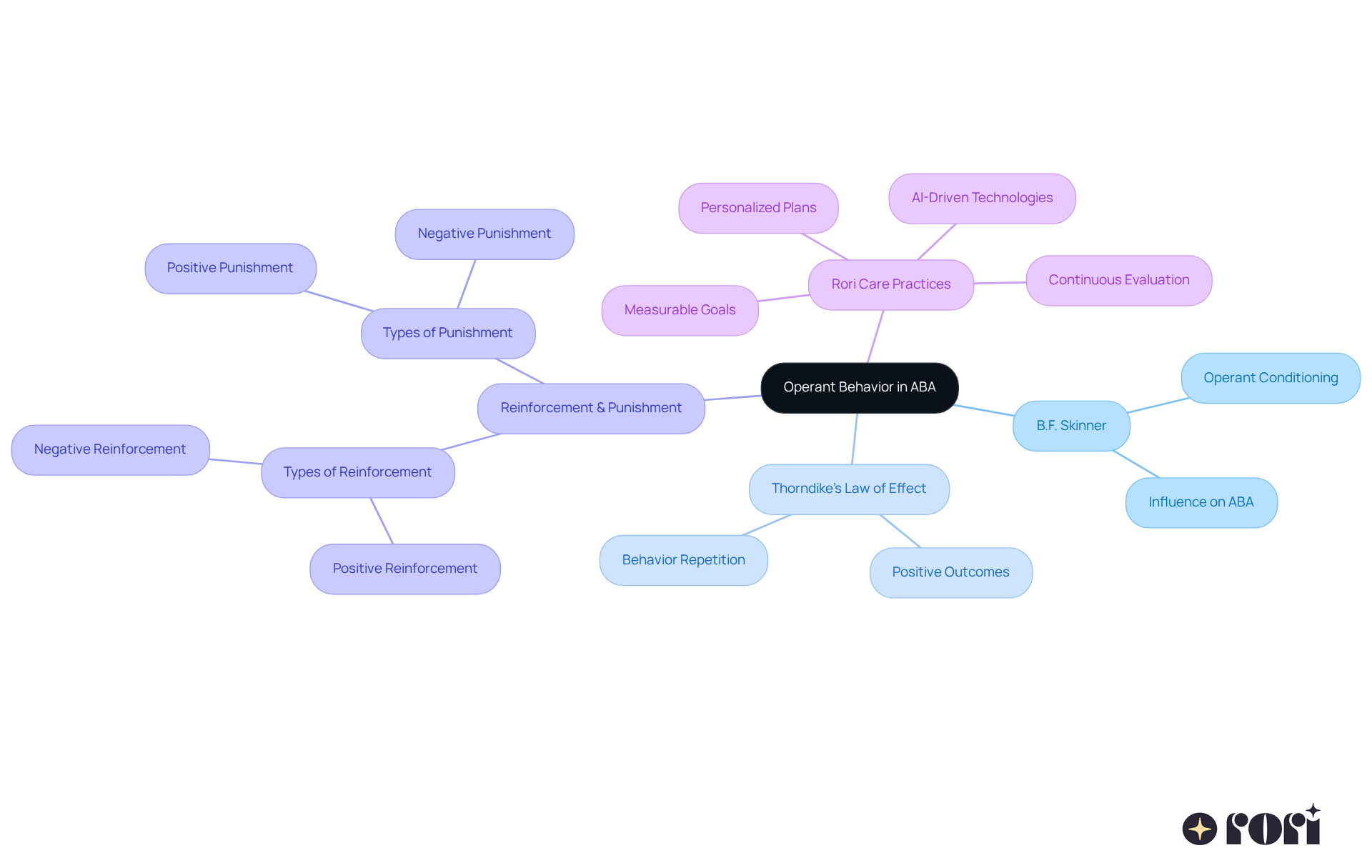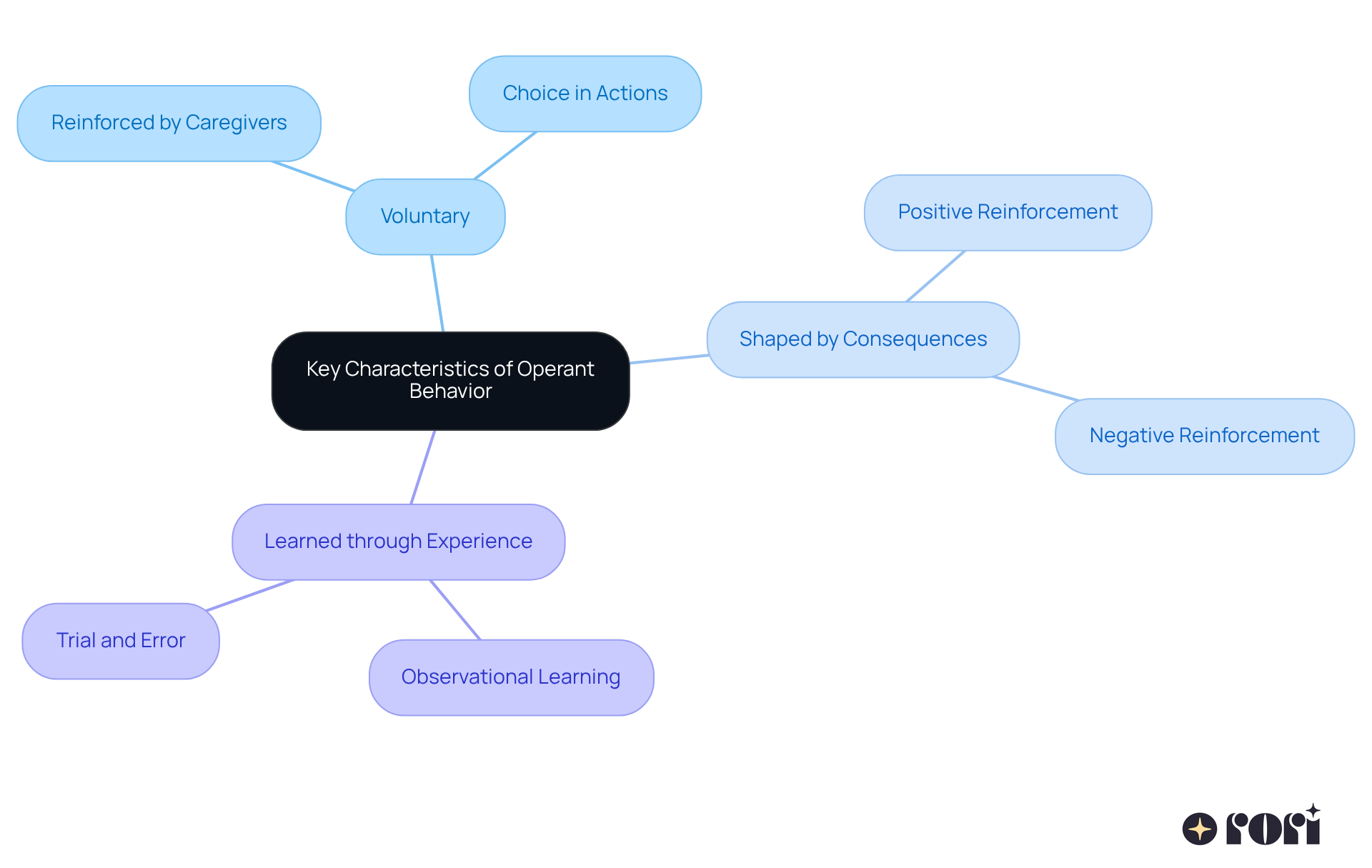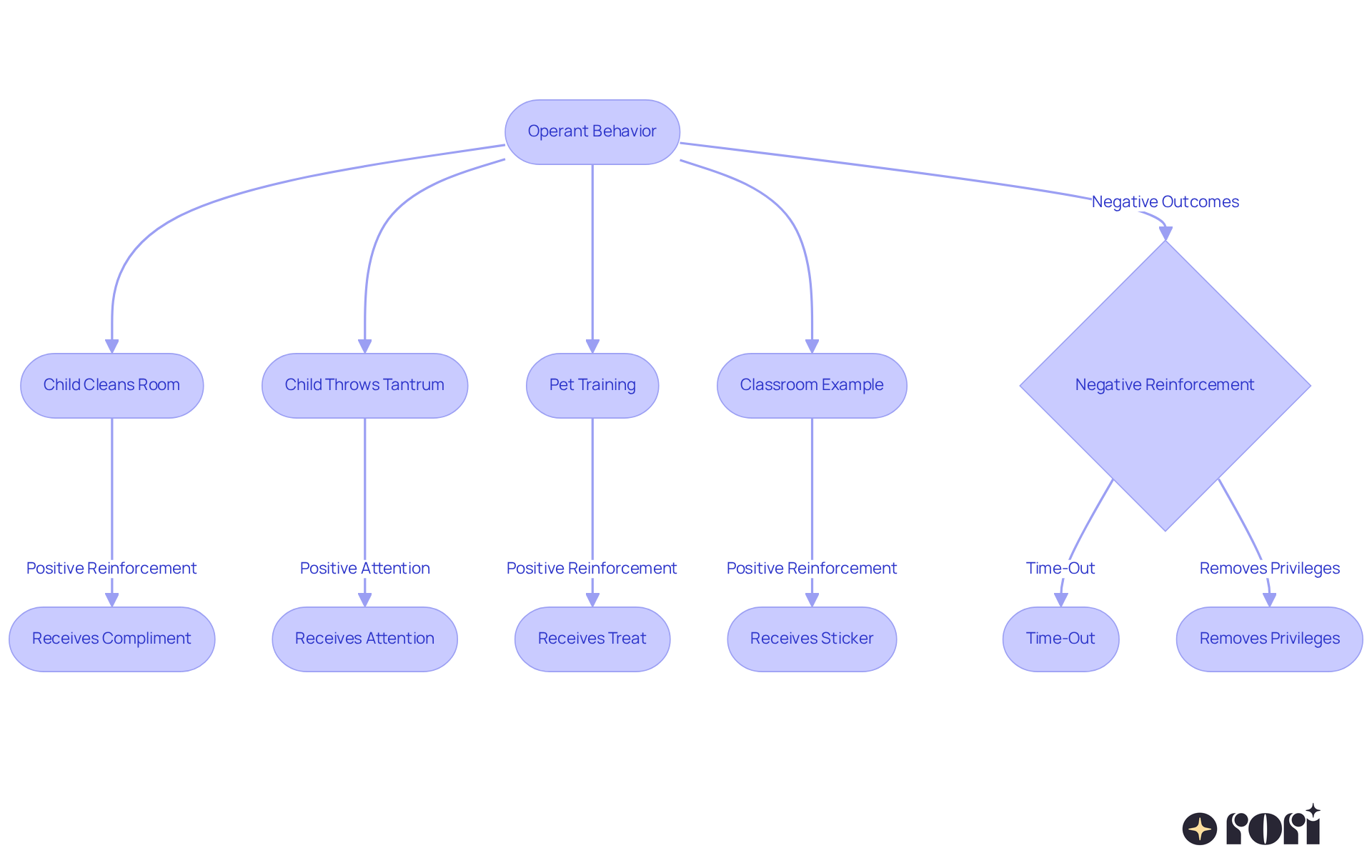Operant behavior in Applied Behavior Analysis (ABA) is all about how our actions are influenced by their consequences. It’s fascinating how behaviors can be shaped through reinforcement and punishment, helping to promote positive actions while reducing those that aren’t so helpful. Understanding this concept is super important for parents! It gives you the tools to support your child's development with targeted interventions and positive reinforcement. This way, you can really enhance their behavioral outcomes.
Let’s explore this together! By grasping how operant behavior works, you can create a nurturing environment for your little ones. Imagine using simple strategies that not only guide them but also foster their growth. It’s about building a strong foundation for their future, and we're here to help you every step of the way! 😊
Understanding the intricacies of operant behavior is essential for parents navigating the world of Applied Behavior Analysis (ABA). This concept revolves around the idea that actions are shaped by their consequences, which can significantly enhance a child's learning and development. But how can parents effectively use this knowledge to encourage positive behaviors and discourage negative ones?
Exploring the dynamics of operant behavior not only empowers caregivers but also opens the door to transformative strategies. These strategies can lead to meaningful changes in children’s lives. Let’s explore this together! 🌟
What is operant behavior in ABA refers to actions that are influenced by their outcomes, which play a crucial role in Applied Behavior Analysis. This conduct interacts with the environment to yield specific outcomes, making it a cornerstone of modification strategies. For example, when a young person receives recognition for finishing a task, they are more likely to repeat that action, illustrating the concept of conditioning. 😊
Research suggests that positive reinforcement can greatly improve learning results. Studies show that young individuals who receive consistent reinforcement are more inclined to cultivate essential skills and habits. You might notice real-world applications of behavior modification in classrooms, where instructors use reward systems to encourage participation and engagement.
For parents and caregivers, understanding what is operant behavior in ABA is vital. It offers insights into how actions can be effectively altered to support development and nurture independence. Plus, skilled behavior analysts play an essential role in creating tailored plans that incorporate measurable objectives and evidence-based methods, ensuring that interventions are effective and responsive to each individual's unique needs.
Continuous assessment and alteration of these plans are crucial. They enable modifications based on the individual's progress and reactions to interventions. Empowering caregivers with ABA principles and strategies enhances their ability to support their children's behavioral goals through active involvement and data collection. This active participation not only leads to improved behavioral outcomes but also fosters informed decision-making, ultimately benefiting the child's development.
It's important to acknowledge that punishment often encourages avoidance instead of fostering true change in actions. As B.F. Skinner noted, "Behavior is a function of its consequences," emphasizing the foundational principle of conditioning. Establishing a positive atmosphere is crucial for successful conduct modification, as it promotes desirable actions and supports overall growth. Let’s explore this together!

In Applied Behavior Analysis, understanding what is operant behavior in ABA is crucial because it demonstrates how we can shape and modify behaviors. ABA practitioners utilize conditioning methods to promote positive actions and diminish challenging ones, illustrating what is operant behavior in ABA. For example, a therapist might use positive reinforcement to help a young person with autism understand what is operant behavior in ABA to communicate more effectively.
By understanding the context in which these learned actions occur, parents can play a vital role in supporting their child's growth through targeted interventions. Let’s explore this together! With the right strategies, you can make a real difference in your child's development.
What is operant behavior in ABA, a concept significantly advanced by B.F. Skinner in the early 20th century, is a cornerstone in the field. Skinner built on earlier learning theories, particularly Edward Thorndike's Law of Effect, which tells us that actions followed by positive outcomes are likely to be repeated. By coining the term 'operant conditioning,' Skinner explained what is operant behavior in ABA, detailing how our actions can be shaped through reinforcement and punishment. This foundational study laid the groundwork for modern ABA practices by exploring what is operant behavior in ABA, emphasizing how consequences can influence behavior and guide the personalized approaches used at Rori Care.
At Rori Care, we dream of a future where every young person can flourish through the transformative power of ABA therapy. Our dedicated analysts craft personalized plans filled with measurable goals and evidence-based strategies, ensuring that each young person’s unique needs are met. By blending established therapies with innovative AI-driven technologies, we empower families and therapists to achieve remarkable outcomes, fostering positive changes and skill development. Continuously evaluating and adjusting these programs is vital for nurturing sustainable growth in children's daily lives.

When we consider what is operant behavior in ABA, we notice a few key characteristics:
These actions aren't something we're born with; instead, they develop based on our surroundings and experiences, particularly in relation to what is operant behavior in ABA.
For instance, when caregivers actively join in their children's learning adventures, they can really reinforce those positive behaviors. It's amazing how what is operant behavior in ABA can be encouraged or discouraged, which impacts how often these behaviors occur in the future. Take a young person who discovers that saying 'please' helps them get what they want; chances are, they'll remember to use polite language more often!
Understanding these traits is so important for parents as they guide their children's behavioral growth. With the right ABA principles and strategies in hand, they can enhance their ability to support their children's behavioral goals. Let’s explore this together and see how we can make a difference!

Operant conduct shows up in our everyday lives, highlighting its role in shaping our actions. For example, when a young person tidies their space and receives compliments from their guardians, it reinforces that positive behavior. Research tells us that positive reinforcement, like a simple 'great job!', can really boost a young person’s motivation and willingness to comply—it’s a powerful tool for changing behavior!
Similarly, when a child throws a tantrum and gets attention—whether it’s positive or negative—they might continue this behavior to get those reactions again. This really highlights how attention can unintentionally strengthen behaviors we’d rather not see. In pet training, we often use treats to reinforce commands, showcasing how rewards can encourage the actions we want. For instance, a dog might learn to sit on command when it gets a treat every time it does it right.
In classrooms, teachers use reinforcement techniques too, rewarding students for completing assignments or showing positive behavior, like handing out stickers or offering extra playtime. These strategies not only motivate students but also create a joyful learning atmosphere. On the flip side, techniques like time-outs or removing privileges can effectively discourage unwanted behaviors, showing just how versatile operant conditioning can be in parenting.
It’s so important for caregivers to actively engage with these principles. By learning about ABA strategies, they can make informed choices that positively influence their children’s growth, leading to better behavioral outcomes. This empowerment can ease stress and improve family dynamics, supporting the child’s development. Overall, these examples really highlight what is operant behavior in ABA and its vital role in shaping actions across various settings, especially in parenting and education. Let’s explore this together!

Understanding operant behavior in Applied Behavior Analysis (ABA) is so important for parents and caregivers who want to encourage positive growth in their children! This concept centers on the idea that behaviors are shaped by their consequences, highlighting how crucial reinforcement is in promoting desirable actions. By getting a handle on operant behavior, caregivers can effectively support their children’s development and foster independence.
Key insights from the article remind us that operant behavior isn't something we're born with; it’s learned through our experiences and interactions with the world around us. Positive reinforcement—like a simple word of praise or a small reward—can really boost motivation and encourage kids to repeat those good behaviors. Plus, the article shows how consistently applying ABA principles can lead to better behavioral outcomes, which really underscores how active participation from caregivers makes a difference.
Looking at the bigger picture, the importance of operant behavior goes beyond just individual development; it influences family dynamics and educational settings too. By embracing ABA principles and actively engaging in behavior modification strategies, caregivers can create nurturing environments that spark positive change. This proactive approach not only empowers families but also helps children thrive, paving the way for a more harmonious and supportive atmosphere for growth and learning. Let’s explore this together and see how we can make a difference in our children’s lives!
What is operant behavior in Applied Behavior Analysis (ABA)?
Operant behavior in ABA refers to actions that are influenced by their outcomes, which are crucial for behavior modification strategies. This behavior interacts with the environment to produce specific results, such as when a young person receives recognition for completing a task, making them more likely to repeat that action.
How does positive reinforcement affect learning outcomes in children?
Research indicates that positive reinforcement can significantly improve learning results. Children who receive consistent reinforcement are more likely to develop essential skills and habits, as seen in classroom settings where teachers implement reward systems to encourage participation.
Why is it important for parents and caregivers to understand operant behavior in ABA?
Understanding operant behavior in ABA helps parents and caregivers gain insights into how actions can be effectively modified to support development and foster independence. This knowledge allows them to participate actively in interventions tailored to their child's unique needs.
What role do behavior analysts play in ABA?
Skilled behavior analysts create individualized plans that incorporate measurable objectives and evidence-based methods, ensuring that interventions are effective and responsive to each person's unique needs.
How do continuous assessment and modification of intervention plans benefit individuals?
Continuous assessment and adjustment of intervention plans are essential as they allow modifications based on the individual's progress and responses. This process empowers caregivers with ABA principles, enhancing their ability to support their children's behavioral goals.
What is the impact of punishment on behavior modification?
Punishment often encourages avoidance rather than fostering true changes in behavior. Establishing a positive atmosphere is crucial for effective behavior modification, as it promotes desirable actions and supports overall growth.
How can parents support their child's growth through ABA?
By understanding the context of operant behavior and implementing targeted interventions, parents can play a vital role in supporting their child's development. With the right strategies, they can make a significant difference in their child's behavioral outcomes.